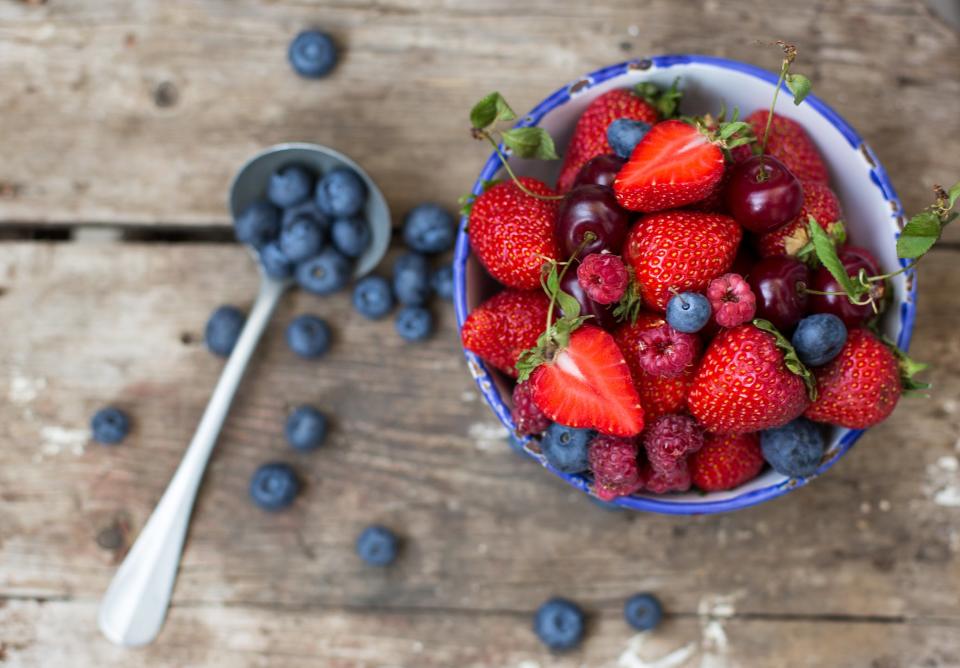These Are the Fruits You Should Be Eating More of This Summer
Even when it’s blazing hot outside, you can always count on one consolation during the dog days of summer: the seasonal bounty of fresh fruits. Berries — everyone’s favorite natural sweet treat — are at peak freshness in many areas of the country during the summer months, making them not only almost universally available but also affordable. And beyond rock-bottom summer prices, there are more advantages to stocking up on berries. These juicy gems are packed with tons of nutrients that benefit your health, and they can easily be worked into breakfasts, lunches, dinners, and snacks. Here are our six top reasons to make berries a part of your diet as often as possible this season.

1. They’re seasonal. The seasonality of berries may vary depending on where you live, but in many parts of North America, summer is harvest time for strawberries, blueberries, blackberries, and raspberries. (If you’re not sure what’s growing near you, check out The Seasonal Food Guide, an awesome online resource that can tell you exactly what is in season and where any time of year.) Eating seasonally and locally means you’ll not only enjoy the ripest, freshest fruit, but you’ll also promote sustainability by reducing the number of miles your produce has to travel to reach you. And again, seasonal fruit equals cheap fruit. Stock up now while prices are low.
2. They’re crazy high in fiber. It may not be the most glamorous nutrient, but fiber plays many important roles in the body, from increasing satiety to helping the digestive system function smoothly — and sadly, most of us aren’t getting enough of it. The average American takes in only 16 grams per day, but according to the Dietary Guidelines for Americans, women should really be getting at least 25 grams, and men 38 grams. Let berries help you reach your goal! One cup of strawberries contains three grams; one cup of blueberries, 3.6 grams; and one cup of raspberries, a whopping eight grams. Sounds like a lot more appetizing way to get your fiber than choking down some grainy supplement in your morning OJ.
3. They’re loaded with antioxidants. Time and again in clinical research, berries win the title of some of the most antioxidant-rich foods on the planet — with cranberries, blueberries, and blackberries sitting at the top of the list. Antioxidants are chemical compounds that help “clean” the body’s cells by removing harmful molecules called free radicals. Consuming them in fruits and vegetables has been linked to numerous health benefits, from slowing the aging process of skin to boosting the immune system. Researchers are even exploring how compounds in blueberries might make cancer treatment more effective. Hooray for food as medicine (and delicious food, at that)!
4. And don’t forget other vitamins and minerals. Some vitamins and minerals double as antioxidants, and some do not. Berries are full of both kinds. Blueberries and blackberries pack a punch of vitamin K, the nutrient that helps blood clot. And while oranges tend to get all the glory when it comes to vitamin C, virtually all types of berries are also bursting with this critical nutrient. Ounce for ounce, strawberries contain more of it than most citrus fruits, with a single cup supplying almost 150 percent of your daily requirement. Strawberries also boast a significant amount of manganese, a mineral essential for maintaining bone and connective tissue.
5. They’re versatile. It’s really not difficult to work berries into any meal or snack. (How many other foods can you say that about?) Their sweetness can complement a variety of other flavors or simply stand alone. As a plain side dish, they need no ornamentation, but they’re also at home in sauces, smoothies, salads, and desserts. At breakfast, sprinkle blueberries on oatmeal, cereal, or waffles. Toss raspberries on a salad at lunch. Snack time? Blend a frozen variety with yogurt for a berry smoothie. And at dinner, incorporate strawberries as a sweet complement to savory meats or plant-based protein.
6. They keep well. Wait, berries keep well? Don’t they usually go from plump perfection to fuzz-covered nastiness before you can use them up? Yes, sometimes, but you can avoid this problem by freezing them. Simply wash your berries, cut them to your liking, and freeze them on a wax-paper-lined baking sheet for a couple of hours. Stored in an airtight container, they’ll keep in the freezer (where you can pull them out at will for smoothies, muffins, and pies) for up to 12 months. Or, if you’re feeling extra adventurous, try your hand at canning or drying them. Berries make great starter material for these preservation methods.
What’s your favorite summer berry? Tweet us at @BritandCo!
(Photo via Getty)


